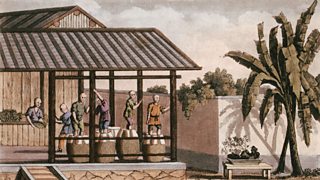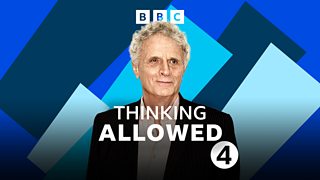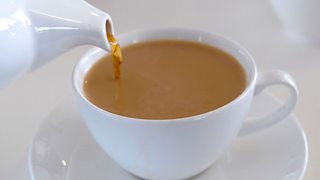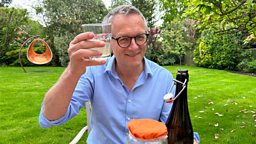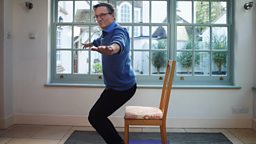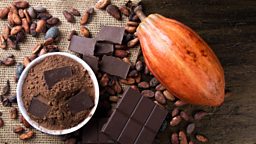Who knew a brew was so good for you?
Making a cup of tea is already a reflex action for millions of people in Britain. In fact a whopping 100 million cups of tea are drunk in the UK every single day!
Tea is more than just one of the nation’s favourite hot beverages. It can provide numerous health benefits such as reducing stress levels, improving memory and even reduce the risk of bone fractures.
In Just One Thing, Dr Michael Mosley finds out why tea is such a special brew and what elements of this – actually quite complicated – drink are doing the good work.

Tea is good for your bones
Tea comes from Camellia Sinensis, an evergreen shrub native to East Asia. Its leaves are packed with polyphenol compounds that have an antioxidant quality as well as other benefits, including promoting healthier bones. A study of over a thousand older women over a decade showed that those who drank three or more cups of tea a day were 30% less likely to suffer from a fracture due to osteoporosis, a thinning of the bones, compared to those who drank one cup of tea or less per week.

Tea can help you relax more quickly
Tea has more than 200 bioactive components overall, one of which is L-theanine, a bioactive amino acid. L-theanine increases the levels of a neurotransmitter called gamma aminobutyric acid, known as GABA. It’s believed that the effect of this is to reduce the stress response in the brain.
Professor Andrew Steptoe, an expert on the benefits of tea at University College London, has done some rigorous testing in this area to show that the reduction of stress was more than just an association between tea and relaxing downtime. “We did a double-blind placebo-controlled trial with two beverages. One of them had all the critical biological ingredients of tea and the other didn't.” Participants had their blood pressure and their levels of the stress hormone cortisol taken before and after being given a challenging task – in this case, an impromptu speech. Those who drank tea enjoyed a much more rapid post-stress recovery. Professor Steptoe puts this down to the increase in GABA levels.
Tea is a brain-booster too
The L-theanine in tea has another benefit too – improved brain power! Using brain scans, researchers say that the L-theanine acts with the caffeine in tea to increase the activity of the alpha brainwaves that are associated with calm, alertness, creativity and the ability to take on new information. This also helps with memory and reaction time.
Drink tea for a longer life!
It seems like tea really is an elixir of life! An 11-year study of half a million people in the UK found that those who drank two or more cups a day had a significantly lower risk of dying over the period of the study, with tea lowering the risks of stroke and heart disease.
People who drink tea may be at lower risk for cardiovascular disease and for coronary heart disease.Professor Andrew Steptoe
Professor Steptoe concurs that, “There is evidence from population studies that people who drink tea may be at lower risk for cardiovascular disease and for coronary heart disease.” In order to find out more he and his team focused on two factors the cause of heart disease: inflammation in the body, and platelets – small cells circulating in the bloodstream that help heal wounds but which can increase the risk of heart disease if they clump together. The activities of both were measured before and after a six-week period where participants either drank tea or a placebo drink. Those who drank tea reported lower levels of platelet activation and inflammation.
Tea with milk still counts for those health benefits
Most of us have tea with sugar and/or milk, rather than just black. Fortunately, these additions aren’t going to get in the way of the benefits of your cup of tea. The key factor is how long you let the tea steep for so that the bioactive elements of it have time to activate. On that basis, builder’s tea is a good way to go!
Could YOU become a ‘teaist’?
With so many benefits, the advantages of turning into a ‘teaist’, someone who loves tea, seem quite clear. It’s harder for some than others to make it part of their routine though. On the Just One Thing podcast, Michael Mosley asks prop and costume-maker Kit to drink a couple of cups of tea a day for a week instead of her usual morning coffee and fizzy drink in the afternoon (or hot chocolate, depending on the season). Despite not factoring tea into her life beforehand, the change was a success.
“I've managed to swap out the morning coffee, which I think has been a real benefit,” says Kit. “I can see the changes that has made to how my day starts, the nervous energy has been taken away and I have noticed the day has been a lot calmer. So that was a real positive. I think the tea definitely gives a little buzz, but not the super heavy one of coffee that is my go-to in the morning. So, yeah, that's a permanent change.”
More from Βι¶ΉΤΌΕΔ Radio 4
-
![]()
All Consuming - Tea
Charlotte Stavrou and Amit Katwala steam ahead with the story of tea.
-
![]()
In Our Time - Tea
Melvyn Bragg and guests discuss tea, the first truly global commodity.
-
![]()
Thinking Allowed - Tea
Tea: A dark history of Britain's favourite beverage.
-
![]()
File on 4 - The Cost of a Cuppa
Jane Deith investigates conditions for tea workers in Assam.


